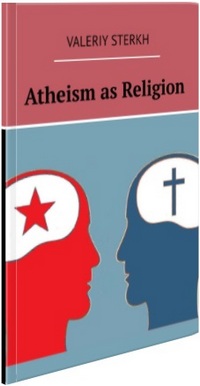Christian reading
Issue N54

Atheism as Religion
Chapter 5. Evidence for the nonexistence of God (beginning)
As noted above, it is impossible to prove the non-existence of God, yet Atheism doesn’t give up easily. This is the chief paradox of Atheism or, as it is also called, its epistemological problem.
All attempts to "prove" the non-existence of God can be divided into two categories: logical proofs (a priori, pre-experimental speculative reasoning) and empirical proofs (a posteriori, reasoning based on experiential data). Let us consider the most common "proofs" and review them briefly.
Proof 1:
An omnipotent God does not exist because it is impossible to create the impossible. For example, can God create a stone that no one can lift? If not, then he is not omnipotent. If yes, then neither can God lift such a stone, which would contradict his claim to omnipotence.
In this case, atheists take the word "omnipotent" literally and see God as "someone who can do anything without any limitations". This is not entirely correct. When applied to God, the title "omnipotent" means "someone who can do all things according to his design". This begs the question: “Why would God want to create something as meaningless as a stone that no one can lift”?
God’s actions always have a purpose, and he can do anything to fulfil his providential designs. This is what God’s omnipotence means.
Proof 2:
The God of all perfection does not exist, because if such a God existed, then everything he created – the universe, earth, animals, and man – would also be perfect. But since creation is imperfect, there is no perfect Creator.
This argument is used primarily by atheists who are not familiar with basic theology. Atheists don’t seem to fully grasp the theology of the fall and its consequences. Creation was originally perfect but has been damaged. How would this happen and why? There’s a great deal of theological literature on this subject, and we would highly recommend reading it to learn more.
It is also important to know that at the end of history, this world will be transformed by God, and all that is imperfect will be set right.
Proof 3:
The God of all mercy cannot exist because there is evil and suffering in the world.
God did not create evil or suffering. These came into the world after the fall. As already mentioned above, I would highly recommend studying the fundamentals of theology before attempting to criticize them. Otherwise, any criticism would look too incompetent.
Besides, there is enough kindness and justice in the world to demonstrate God's mercy. At the end of history, there will be a time of reckoning for all the evil and suffering inflicted upon this world.
Proof 4:
An omniscient God does not exist, because if he had known that his creation would rebel against him, he would have prevented it.
Atheists should carefully study the doctrine of free will. God does not force us to believe in anything or lead a certain way of life. Yet, at the end of life, each person shall reap what they have sown.
Proof 5:
The Creator God does not exist because science has explained how the universe, earth, animals, and man appeared without using the God hypothesis. Creationism contradicts scientific evidence.
There are many scientific theories that attempt to explain the origin of the universe. Some of them contradict each other. Some scientists claim that the universe is eternal. Others say that the universe has a beginning and end. And still others came up with the theory of a cyclic universe. Who is correct? There are no scientific criteria for establishing the truth in this matter. This is why such theories are no better than theology.
Creationism says that the universe, planet Earth, major life forms, and humanity were created by God himself. This general doctrine has various strands – some convincing, some less so. Besides, creationism is constantly evolving, and if any element contradicts reliable scientific data, it can always be modified or eliminated. After all, scientific theories undergo the same process.
(to be continued)